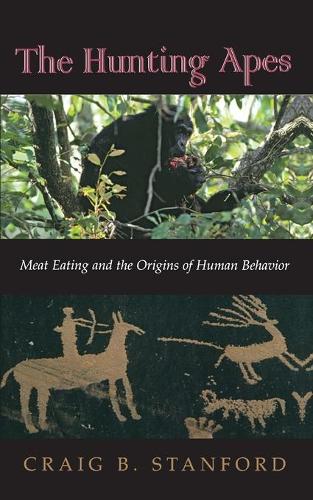
The Hunting Apes: Meat Eating and the Origins of Human Behavior
(Paperback)
Publishing Details
The Hunting Apes: Meat Eating and the Origins of Human Behavior
By (Author) Craig B. Stanford
Princeton University Press
Princeton University Press
8th May 2001
United States
Classifications
Professional and Scholarly
Non Fiction
Human biology
Evolution / Evolutionary biology
Popular science
599.938
Physical Properties
Paperback
272
Width 114mm, Height 191mm
255g
Description
What makes humans unique What makes us the most successful animal species inhabiting the Earth today Most scientist agree that the key to our success is the unusually large size of our brains. Our large brains gave us our exceptional thinking capacity and led to humans' other distinctive characteristics, including advanced communication, tool use, and walking on two legs. Or was it the other way around Did the challenges faced by early humans push the species toward communication, tool use and walking and, in doing so, drive the evolutionary engine toward a large brain In this text, author Craig Stanford presents an alternative to this puzzling question. According to him, what make humans unique is meat. Or, rather, the desire for meat, the eating of meat, the hunting of meat and the sharing of meat. Stanford argues that the skills developed and required for successful hunting and especially the sharing of meat spurred the explosion of human brain size over the past 200,000 years. He then turns his attention to the ways meat is shared within primate and human societies to argue that this all-important activity has had profound effects on basic social structures that are still f
Reviews
"A provocative, eminently digestible book... Stanford writes clearly and often deftly, and with admirable concision... [A] marvelous exploration of evolutionary hypotheses ... fascinating stuff."--Michael Pakenham, The Baltimore Sun "Anyone who would like to review all of the arguments on human origins should read The Hunting Apes... This book will go a long way in explaining why physical anthropologists and their colleagues fight so much."--Deborah L. Manzolillo, Times Literary Supplement "A brave academic endeavour and a fine piece of popular science writing... Stanford's book summarises a huge body of evidence in a pleasing, coherent and non-polemic way. You'll feel that you're talking with a learned ... dinner companion, rather than enduring a lecture or hectoring sermon from an academic pulpit."--Adrian Barnett, New Scientist "Stanford's ideas, while controversial, are amply documented by behavioral studies of nonhuman primates, anthropological studies of a number of human societies and archeological studies of early and pre-humans."--Publishers Weekly "[A] provocative new look at what made people so smart... This is a fascinating book, written for the nonspecialist."--Booklist "An unabashed celebration of the carnivorous tendencies of early humankind. Virtually every aspect of Stanford's thesis about the importance of meat acquisition and sharing among early humans is steeped in controversy."--Kirkus Reviews "[An] admirable little book... [Stanford's] meticulously constructed study is both readable and thought-provoking and gives fascinating insights into the behaviour of our species."--The Tablet "The Hunting Apes is a very enjoyable and quick read, written for a broad audience... These are well-written synopses--good for students, the general informed public, and those in anthropology and other sub-disciplines who want to keep up on these topics."--M. Tappen, Journal of the Royal Anthropological Institute
Author Bio
Craig B. Stanford is Associate Professor of Anthropology and Co-Director of the Jane Goodall Research Center at the University of Southern California. He has conducted field studies of apes and monkeys in Africa, Asia, and Latin America. His other works include Chimpanzee and Red Colobus.
